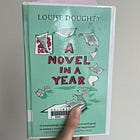#5 - A Novel in a Year
Weeks 17-20: what is your novel about? secret anxieties, and a ten-week plan

Hello,
We are already on the fifth post for the ‘A Novel in a Year’ project that was inspired by Louise Doughty’s book of the same name. For new readers to TBOI, this post is a little different to other things that I share here. These act as a digest where I include some of my responses to the exercises. My hope is for posts such as this to log my progress and hold me accountable - so if these are of no interest to you, then please read no more!
However, if you are interested in following along, here is a link to last month’s piece:
Also, these ANIAY posts come out on a Monday, so there will be an additional post on Wednesday about something completely different 😀
Week 17
Doughty begins this chapter with: What is your novel about?
A seemingly straightforward question that caused me much anxiety. How do I put into one or two sentences (she recommends keeping this short) to what is a nebulous group of ideas?
She says to avoid writing about the themes of the book as these don’t say anything e.g., loneliness, or death and so on. And then she provides some examples:
Hamlet is about a Danish princes who thinks his uncle murdered his father and can’t make up his mind whether or not to take revenge. Jane Eyre is about a plain governess who falls in love with her employer only to discover he’s got a mad missus hidden in the attic.
So here goes:
My novel is about a woman who returns home after an extended absence.
Sounds a bit mundane at this point...
Week 18
There is no specific task for this week, but the accompanying chapter by Doughty did hit on something that I have often thought about related to the secret anxiety of - what if someone steals your work?
I can’t say that I have had much to worry about this particular issue, as I have not shown my creative writing to many people, but it is something that I have wondered about for established writers.
Within this chapter, Doughty also addresses one of my concerns about week 17’s exercise where you were required to describe your novel in one or two sentences. If this was a challenge, then she says that this was a good thing. Phew.
In an ideal world, you should be brimming with ideas that trying to describe your novel feels like describing a huge bouquet of flowers […] The difference being that, unlike a bouquet of flowers, a novel is more than a pretty and deceptively artless display of colour.
Week 19
For this week’s exercise, Doughty asks you to write a CV for the main character. This can be completed in either continuous prose or in note form, and she provides some starters. My central character has morphed a little in my mind’s eye over the past few months (there have been multiple name changes until I settled on Emily), but the broader ‘sense’ about her has remained the same.
Name: Emily Thompson
DOB: 14/12/1980
Education: local state school, university - marketing/business degree?
Parent’s origins: Yvette and Jim both born and raised in and around the fictional market-town where the book is predominately set
Siblings: Older sister, Caitlin
Profession: Director of Communications for a hotel group
Favourite colour: Purple
Favourite food: Sunday lunch
Favourite TV programme: what she tells people – Succession, what she really enjoys watching – Real Housewives of Beverly Hills
Week 20
Doughty announces at the beginning of this chapter that “we are now entering Phase 2”.
I notice myself tense at reading this, as I recognise that this is the part when shit gets real.
Get your diary out and take a critical look. Find everything that is cancellable for the next ten weeks, and cancel it. Be ruthless.
Beyond this, Doughty says to look at what time you have available and set yourself a weekly target. She says that she will often set herself a high target in the knowledge that she may not meet it. But other people are spurred on by setting a low target. And not for the first time during this project, I am reminded of the stories we often must tell to persuade ourselves to do something.
To my immense relief, during this ten-week writing stretch, she recommends that you just write what comes to you, i.e., you don’t have to write chronologically, and even if you aren’t sure how it would fit into the book, that’s fine, as long as you have a general feeling that it will probably go in somewhere.
The first thing I did for this week’s exercise was to look at my calendar over the course of one week. I have found that I have a better headspace for creative writing in the afternoon, and so I am going to block out an hour a day (during the week) to focus on my book.
We shall see how that goes.
Whether it is for a novel or for something different (such as your Substack posts), how do you commit to your writing? Do you try to write at a particular time each day/every few days?
I’d love to hear from you.
Best,
Sarah




Good for you, Sarah! Scheduling and committing to your writing time makes a difference, for sure. I do what you do, looking at the week ahead and setting aside the time to work on my novel and Substack. I stick to it, more or less, while remaining flexible.